I Wake Up Streaming: June 2021
Movies
In this edition of “I Wake Up Streaming,” novelist William Boyle rounds up his top streaming picks for the month of June. The column’s name is a play on the 1941 film I Wake Up Screaming, starring Betty Grable, Victor Mature, and Carole Landis. While the film’s title hits a pleasing note of terror and despair, changing that one letter speaks to the joy of discovering new films and rediscovering old favorites, as well as the panic that comes with being overwhelmed by options.
Ruby in Paradise (Prime Video)
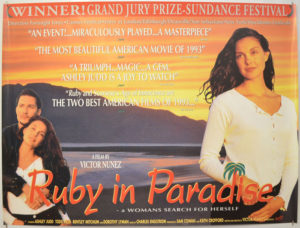 Victor Nunez’s Ruby in Paradise has never gotten a DVD or Blu-ray release, but it’s just recently arrived on Prime in a new HD transfer. It’s inexplicably faded a bit from our collective consciousness, which is a shame. Nunez is obsessed with silences and with human behavior. He’s a compassionate and sympathetic writer and director. Ruby in Paradise feels a lot like a Willy Vlautin novel. The subject matter is sad on the surface, and yet the film winds up being hopeful and life affirming. Ashley Judd is wonderful as Ruby Lee Gissing, a Tennessee woman running away from something to a place she visited once as a girl, her only idea of paradise. But paradise just winds up being dive bungalow courts and tourist shops and the dead weirdness of life after spring break in a beach town. The Florida setting—Panama City and Panama City Beach—is one of the truest portraits of Florida and the South I’ve ever seen. It feels totally and tonally right and real. The film won the 1993 Grand Jury Prize at Sundance. Roger Ebert had it on his top ten list for the year. Judd won the Independent Spirit Award for Best Female Lead, but she should’ve won more awards for her performance. A beautiful film from a truly underrated and neglected director.
Victor Nunez’s Ruby in Paradise has never gotten a DVD or Blu-ray release, but it’s just recently arrived on Prime in a new HD transfer. It’s inexplicably faded a bit from our collective consciousness, which is a shame. Nunez is obsessed with silences and with human behavior. He’s a compassionate and sympathetic writer and director. Ruby in Paradise feels a lot like a Willy Vlautin novel. The subject matter is sad on the surface, and yet the film winds up being hopeful and life affirming. Ashley Judd is wonderful as Ruby Lee Gissing, a Tennessee woman running away from something to a place she visited once as a girl, her only idea of paradise. But paradise just winds up being dive bungalow courts and tourist shops and the dead weirdness of life after spring break in a beach town. The Florida setting—Panama City and Panama City Beach—is one of the truest portraits of Florida and the South I’ve ever seen. It feels totally and tonally right and real. The film won the 1993 Grand Jury Prize at Sundance. Roger Ebert had it on his top ten list for the year. Judd won the Independent Spirit Award for Best Female Lead, but she should’ve won more awards for her performance. A beautiful film from a truly underrated and neglected director.
Narc (Prime Video)
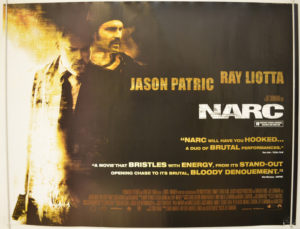 Released in 2002, Joe Carnahan’s Narc has the atmosphere and tone of a ’70s cop picture. It’s set in Detroit (but shot mostly in Toronto, with only one day of exterior shooting in the Motor City). Ray Liotta stars as Lt. Henry Oak and Jason Patric plays tortured undercover narc Nick Tellis. Carnahan coaxes a trembling weariness out of his actors. Everyone is on edge, waiting for the world to cave in. Liotta’s magnetic. That sharp stare. Those exhausted expressions. A violent uneasiness behind everything he does. We’re never quite sure where we stand with Oak once he enters the narrative. Is he a hero? A villain? Somehow, he manages to seem like both of these things and neither. What he is above all, in Liotta’s capable hands, is the film’s beating heart. Roger Ebert said that Jason Patric, more than ten years removed from Rush, looks less like an actor playing a cop here and more like an actual cop. A high compliment. Tellis has to make hard decisions throughout, and he most often makes the wrong one. Patric plays it all with a pained neutrality. Narc, like the great crime pictures of the ’70s, casts moralizing aside. It’s punchy and gritty, mysterious without being vague, violent, and washed out, a hard portrait of the anguished lives of these Detroit narcotics officers. Mostly, though, it’s a lesson in how to create and sustain tension. Every scene, every shot, feels heavy with significance. Every line, especially when it’s Liotta or Patric speaking, gives us a sense of all that’s boiling under the surface.
Released in 2002, Joe Carnahan’s Narc has the atmosphere and tone of a ’70s cop picture. It’s set in Detroit (but shot mostly in Toronto, with only one day of exterior shooting in the Motor City). Ray Liotta stars as Lt. Henry Oak and Jason Patric plays tortured undercover narc Nick Tellis. Carnahan coaxes a trembling weariness out of his actors. Everyone is on edge, waiting for the world to cave in. Liotta’s magnetic. That sharp stare. Those exhausted expressions. A violent uneasiness behind everything he does. We’re never quite sure where we stand with Oak once he enters the narrative. Is he a hero? A villain? Somehow, he manages to seem like both of these things and neither. What he is above all, in Liotta’s capable hands, is the film’s beating heart. Roger Ebert said that Jason Patric, more than ten years removed from Rush, looks less like an actor playing a cop here and more like an actual cop. A high compliment. Tellis has to make hard decisions throughout, and he most often makes the wrong one. Patric plays it all with a pained neutrality. Narc, like the great crime pictures of the ’70s, casts moralizing aside. It’s punchy and gritty, mysterious without being vague, violent, and washed out, a hard portrait of the anguished lives of these Detroit narcotics officers. Mostly, though, it’s a lesson in how to create and sustain tension. Every scene, every shot, feels heavy with significance. Every line, especially when it’s Liotta or Patric speaking, gives us a sense of all that’s boiling under the surface.
The Thing Called Love (Paramount Plus)
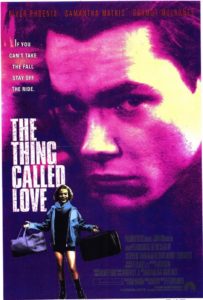
As a kid growing up in Brooklyn, I found myself drawn to stories about characters leaving New York City for some other dream. I loved Samantha Mathis’s Miranda Presley for that reason. I loved her dream of writing songs in Nashville. I loved that she was doing it for her dad, who loved country music and who had gone into a hospital and never come out. This movie is what first made me want to go to the South. I didn’t like country music at that point or know any of the real musicians who appear. I didn’t know the Bluebird Cafe or the Ryman. I didn’t know much of anything about Nashville music history, and yet I felt it all there, felt more than I knew. I wound up in the South years later, chasing something too. The Thing Called Love is far from perfect. When I was young, I wouldn’t have made much of the fact that Peter Bogdanovich directed it. Rewatching it now, I find it hard not to hold the film up against the ’70s masterpieces he collaborated on with Polly Platt, which can make it feel especially slight and flimsy, and yet—in my book—there’s something special about that slightness and flimsiness. It has the quality of one of the songs its characters write—missing the mark somehow, almost there, but shot through with passion and earnestness. It’s incredibly sad to watch River Phoenix in his last role and think about the career he might’ve had. (Bogdanovich has said in interviews that Phoenix would’ve made a great director.) This isn’t as good as Dogfight or Running on Empty or My Own Private Idaho, but I never got Ebert’s criticism of Phoenix’s performance. I don’t think he looks fucked up or disinterested here. He might’ve been fucked up, but there’s still so much heart and emotion in what he does. He’s gorgeous and sensitive and he makes a kind of toxic character wholly human. No one like him. I fell for Samantha Mathis in Pump Up the Volume, and she was, no doubt, a huge part of why this became one of my favorites back then. She was actually born in Brooklyn, so her put-on New York accent has decent heft to it. Sandra Bullock and Dermot Mulroney are cheesy and likable. The script is by Carol Heikkinen, who also wrote Empire Records. I really like it—a touch of comedy, some nice melodrama, rides a kind of loose hangout vibe. Doesn’t gun for too much. Overall, it’s a tender and melancholy and wistful film, a soft-edged study of big dreams and young dumb love.
The Florentine (Prime Video)
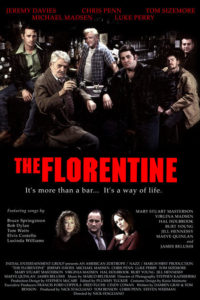 I’d somehow never even heard of this until a couple of years ago. A great forgotten film from 1999. Understated as hell. Produced by Francis Ford Coppola. Shot on location in the Lehigh Valley, Pennsylvania. An incredible cast: Tom Sizemore, James Belushi, Chris Penn, Virginia Madsen, Luke Perry, Michael Madsen, Hal Holbrook, Burt Young, Jeremy Davies, and Mary Stuart Masterson. A soundtrack that includes Bob Dylan, Lucinda Williams, Tom Waits, and Bruce Springsteen. Based on an Off-off-Broadway play from the ’80s, the whole thing unfolds like a Springsteen song. Truly blown away by the fact that I never encountered this in a video store. Great characters, great locations. Only released twenty-two years ago, but it feels so much older than that, in the way that small-scale ’90s dramas can feel like holdovers from the character-driven ’70s. I only saw this for the first time in 2019 because it popped up on Prime and I lucked across it. Its presence there was short-lived, however, and it was gone by the time I recommended it to folks. Anyhow, it’s back on Prime, and I hope folks seek it out. It’s also far from perfect (the voiceover at the beginning and end is particularly unnecessary), but it’s right up my alley in every way.
I’d somehow never even heard of this until a couple of years ago. A great forgotten film from 1999. Understated as hell. Produced by Francis Ford Coppola. Shot on location in the Lehigh Valley, Pennsylvania. An incredible cast: Tom Sizemore, James Belushi, Chris Penn, Virginia Madsen, Luke Perry, Michael Madsen, Hal Holbrook, Burt Young, Jeremy Davies, and Mary Stuart Masterson. A soundtrack that includes Bob Dylan, Lucinda Williams, Tom Waits, and Bruce Springsteen. Based on an Off-off-Broadway play from the ’80s, the whole thing unfolds like a Springsteen song. Truly blown away by the fact that I never encountered this in a video store. Great characters, great locations. Only released twenty-two years ago, but it feels so much older than that, in the way that small-scale ’90s dramas can feel like holdovers from the character-driven ’70s. I only saw this for the first time in 2019 because it popped up on Prime and I lucked across it. Its presence there was short-lived, however, and it was gone by the time I recommended it to folks. Anyhow, it’s back on Prime, and I hope folks seek it out. It’s also far from perfect (the voiceover at the beginning and end is particularly unnecessary), but it’s right up my alley in every way.
Georgia (Paramount Plus)
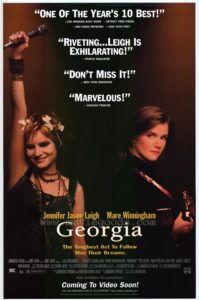 Man, this movie wrecks me. It’s woefully underappreciated and finally available to stream via Paramount Plus. Directed by Ulu Grosbard, whose short filmography fascinates me, and written by Barbara Turner, Jennifer Jason Leigh’s mother. It feels deceptively simple on some level, but it’s not unlike Tender Mercies in its ability to steer clear of trouble and be profound in quiet ways. Leigh gives a blockbuster performance, one of my all-time favorites, as Sadie Flood, a punk bar band singer. It’s a performance that should’ve won her an Oscar (it was a stacked year: Sarandon, Shue, Streep, Stone, Thompson) and more awards. Sadie’s older sister, Georgia, played by Mare Winningham, is a successful folk-country singer with a knockout voice. The movie co-stars Max Perlich, John C. Reilly, Ted Levine, and John Doe of X. Sadie’s relationship with Georgia is the central thread, but mostly we just follow Sadie through a series of dead-end situations—she’s a drunk and addict who lives in the shadow of a star, and yet she’s full of hope. She’s tragic and magnetic, dangerous and brave, simultaneously off the rails and in control. People want to know Sadie, they even love her, and then they’re sorry they fell into her orbit. Elisabeth Moss’s turn in Her Smell owes a great debt to Leigh here, though this movie is softer and less erratic than Alex Ross Perry’s paranoid grunge melodrama. Leigh is heartbreaking. So is Perlich—he has a few scenes that really hit hard. Reilly and Levine made me cry a couple of times, too. Sadie talk-singing Van Morrison’s epic “Take Me Back” at one of her sister’s shows has been a scene that’s haunted me since I first saw the film twenty-five years ago. I’d say I think about it weekly, if not more. It’s one of the most devastating and beautiful scenes I can think of. So much of the drama here takes place on stage, and I’m not sure I’ve ever seen a film pull this off more effectively. The musical performances aren’t filler—they’re maps to who Sadie and Georgia are. What they don’t say in conversations is said between them on stage. Leigh gets Sadie just right, and Winningham is terrific as the talented, graceful, square, reliable Georgia—crowds break out in applause for her and barely clap for Sadie when she performs. This is a film about blood and art and passion and desperation viewed through the lens of a messy life. The juxtaposition of Sadie and Georgia is striking, but the film doesn’t come to any easy conclusions. Sadie’s lost in the world and interesting as hell. Such sad magic.
Man, this movie wrecks me. It’s woefully underappreciated and finally available to stream via Paramount Plus. Directed by Ulu Grosbard, whose short filmography fascinates me, and written by Barbara Turner, Jennifer Jason Leigh’s mother. It feels deceptively simple on some level, but it’s not unlike Tender Mercies in its ability to steer clear of trouble and be profound in quiet ways. Leigh gives a blockbuster performance, one of my all-time favorites, as Sadie Flood, a punk bar band singer. It’s a performance that should’ve won her an Oscar (it was a stacked year: Sarandon, Shue, Streep, Stone, Thompson) and more awards. Sadie’s older sister, Georgia, played by Mare Winningham, is a successful folk-country singer with a knockout voice. The movie co-stars Max Perlich, John C. Reilly, Ted Levine, and John Doe of X. Sadie’s relationship with Georgia is the central thread, but mostly we just follow Sadie through a series of dead-end situations—she’s a drunk and addict who lives in the shadow of a star, and yet she’s full of hope. She’s tragic and magnetic, dangerous and brave, simultaneously off the rails and in control. People want to know Sadie, they even love her, and then they’re sorry they fell into her orbit. Elisabeth Moss’s turn in Her Smell owes a great debt to Leigh here, though this movie is softer and less erratic than Alex Ross Perry’s paranoid grunge melodrama. Leigh is heartbreaking. So is Perlich—he has a few scenes that really hit hard. Reilly and Levine made me cry a couple of times, too. Sadie talk-singing Van Morrison’s epic “Take Me Back” at one of her sister’s shows has been a scene that’s haunted me since I first saw the film twenty-five years ago. I’d say I think about it weekly, if not more. It’s one of the most devastating and beautiful scenes I can think of. So much of the drama here takes place on stage, and I’m not sure I’ve ever seen a film pull this off more effectively. The musical performances aren’t filler—they’re maps to who Sadie and Georgia are. What they don’t say in conversations is said between them on stage. Leigh gets Sadie just right, and Winningham is terrific as the talented, graceful, square, reliable Georgia—crowds break out in applause for her and barely clap for Sadie when she performs. This is a film about blood and art and passion and desperation viewed through the lens of a messy life. The juxtaposition of Sadie and Georgia is striking, but the film doesn’t come to any easy conclusions. Sadie’s lost in the world and interesting as hell. Such sad magic.
William Boyle is the author of the novels Gravesend, The Lonely Witness, A Friend Is a Gift You Give Yourself, and City of Margins, and a story collection, Death Don’t Have No Mercy. His novella Everything Is Broken was published in Southwest Review Volume 104, numbers 1–4. His writing on film has appeared in Oxford American and CrimeReads. He used to have a blog about ’70s crime films called Goodbye Like a Bullet. His website is williammichaelboyle.com.
More Movies


